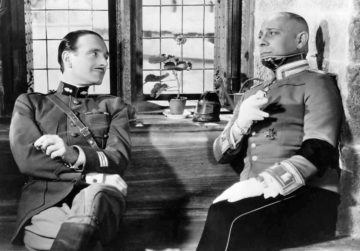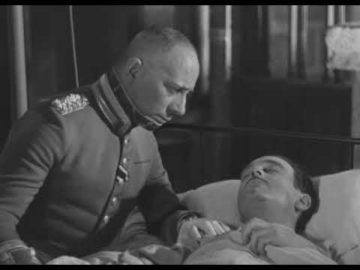by Brooks Riley
 There are momentary flashes in the aesthetic life of an individual which can’t be explained away by the exigencies of personal taste or the broader parameters of gender-biased inclinations. These random epiphanies may or may not have their roots in a psychologically identifiable pantheon of ‘likes’, but when they occur, they yank us from our routine expectations of a work and catapult us into a recessive-compulsive emotional terrain resembling infatuation—with a breathlessness induced by the sudden recognition of something strikingly familiar and yet completely unrelated to us.
There are momentary flashes in the aesthetic life of an individual which can’t be explained away by the exigencies of personal taste or the broader parameters of gender-biased inclinations. These random epiphanies may or may not have their roots in a psychologically identifiable pantheon of ‘likes’, but when they occur, they yank us from our routine expectations of a work and catapult us into a recessive-compulsive emotional terrain resembling infatuation—with a breathlessness induced by the sudden recognition of something strikingly familiar and yet completely unrelated to us.
It’s a given that the brain knows things we don’t know, even if it’s our own grey matter that’s withholding secrets from us. Forget the details of subliminal daily self-maintenance and logistics of being alive, whose rules hold little interest as long as everything is humming along. Consider the other, less tangible connections that the brain makes on its own, regardless of will, regardless of desire—in effect, regardless of me. At times, its affinities seem to have a life of their own, independent of my consciousness or even my history.
 Not long ago, watching an emotional scene between two male Korean detectives in Beyond Evil, I was suddenly transported to Jean Renoir’s anti-war masterpiece La Grand Illusion, set during the First World War: Two aristocratic officers—Rauffenstein, the German commandant of a citadel for prisoners of war, and de Boeldieu a French captive there—are discussing the end of class-oriented military hierarchies and their own shared fate as a dying, useless breed of snobs in the new egalitarian world. Their acquaintance precedes the war, and transcends the level of hostility normally associated with enemies.
Not long ago, watching an emotional scene between two male Korean detectives in Beyond Evil, I was suddenly transported to Jean Renoir’s anti-war masterpiece La Grand Illusion, set during the First World War: Two aristocratic officers—Rauffenstein, the German commandant of a citadel for prisoners of war, and de Boeldieu a French captive there—are discussing the end of class-oriented military hierarchies and their own shared fate as a dying, useless breed of snobs in the new egalitarian world. Their acquaintance precedes the war, and transcends the level of hostility normally associated with enemies.
Their several scenes together have the quiet intensity and built-in sorrow of a doomed love story: Two men who turn out to have wooed the same coquette at Maxim’s, who in peacetime might have become fast friends, are left with the remnants of their old, outmoded rituals, the intimate politesse between privileged equals on opposite sides of a conflict. When de Boeldieu attempts to escape (Le devoir, c’est le devoir), Rauffenstein (played with graceful stoicism by the great Erich von Stroheim) is forced to shoot him (Le devoir, c’est le devoir), aiming at his legs but missing, wounding him fatally. At de Boeldieu’s deathbed, Rauffenstein apologizes, not for having fired the shot, but for his ineptness, a self-effacement in keeping with the mandatory rapprochement between members of a social standing that knows no borders.
 I know these two men. They are two sides of my own father, their unlikely friendship and formality the signposts of a milieu of European upper class manners in which he travelled for decades.
I know these two men. They are two sides of my own father, their unlikely friendship and formality the signposts of a milieu of European upper class manners in which he travelled for decades.
Born in the 19th century, my father hauled it with him into the 20th. A soldier of old-fashioned values supplemented by codes of honor learned at West Point, this son of a grocer was not at all to the manor born (just as Stroheim never held a ‘von’). But Paris and Vienna between the wars became his worlds, as he moved effortlessly between France, Germany, and Austria, between the French language and the German language, between aristocrats and commoners. He once inspected the Maginot Line for the US War Department, declaring it impenetrable. It might have been, but cultural osmosis made such a line imaginary and irrelevant to physical attack.
Like de Boeldieu and Rauffenstein, he was a career officer, and knew very well the rarified social fluidity of those two protagonists, spending weekends at their country homes or discussing realpolitik in the evenings at fashionable Parisian boîtes.
A Maginot line runs through me as well—dividing my own early years in Paris from my late ones in Germany. The osmotic membrane is particularly porous where cultural appropriation is concerned. I am one thing in America, quite another in France and yet another in Germany. I cry through all three national anthems, cherishing the improbable détente between three cultures I call home.
It isn’t just the exquisite artistry of Jean Renoir as a filmmaker, or his acute observations of social nuances at every level of society, but the fact that he somehow stumbled across an amalgam of my own father. The horses hanging on the wall of Boeldieu’s cell could have been the horses my father rode in the Bois de Boulogne. Rauffenstein’s stiff bearing, even if it derived from an injury, looked all too familiar.
When we speak of loving a work of art, we may not always be referring to it as a whole, but rather to certain unexpected moments of edification, or particular details—even as we endow its entirety with the comprehensive nod of aesthetic approbation. I love La Grande Illusion more than any other film. I love every minute of it, and I am not alone. But the ‘shock of recognition’, that extracurricular jolt that seizes my heart when I watch the sequences between Rauffenstein and Boeldieu, is beyond any critical formulation and resides in the murky, subterranean eddies of uncharted emotion.
These jolts come from somewhere deep inside, a place touched by history, one’s own or one that is embedded in the genes. It is said that trauma can be inherited. If this is true, then it’s quite possible that all manner of personal history can leave its mark on the next generation. One is being offered an extraordinary glimpse into a hidden, subconscious identity. This is where archeology may be required, to find remnants that might explain the sudden experience of a history one hasn’t lived, risen to the surface like a dead body one didn’t know existed.
 But what of those two detectives in South Korea? What is it that sent me to Renoir and back again, that made me want to watch the scene over and over again? There is a ritual formality in Korean society that has all but disappeared from the West, if it ever really existed outside of the ruling classes. The link between Boeldieu/Rauffenstein and Lee Dong-sik/Han Joo-won is the formal structure of their encounters. The honor bestowed on the older detective by the younger detective, even as he is obliged to arrest him, is one of the most beautiful filmed moments I can remember. Unlike Renoir’s men, who never cry, Han Joo-won weeps as the click of handcuffs closing around Lee Dong-sik’s proffered wrists is accompanied by the recitation of the Korean version of the Miranda rights. It is a testament to the director that only a single tear appears as the light hits his right cheek. In a making-of video on YouTube, the actor cried far more overtly, which might have disturbed the powerful pathos of the scene. After the second handcuff has closed with a click, Han Joo-won, still clasping the fists of the older detective, bows down 90 degrees so that his face touches them—that bow a formality which conveys utter respect but can also be a deeply-felt apology. There might even be a third, unofficial intention to the bow, to hide his tears.
But what of those two detectives in South Korea? What is it that sent me to Renoir and back again, that made me want to watch the scene over and over again? There is a ritual formality in Korean society that has all but disappeared from the West, if it ever really existed outside of the ruling classes. The link between Boeldieu/Rauffenstein and Lee Dong-sik/Han Joo-won is the formal structure of their encounters. The honor bestowed on the older detective by the younger detective, even as he is obliged to arrest him, is one of the most beautiful filmed moments I can remember. Unlike Renoir’s men, who never cry, Han Joo-won weeps as the click of handcuffs closing around Lee Dong-sik’s proffered wrists is accompanied by the recitation of the Korean version of the Miranda rights. It is a testament to the director that only a single tear appears as the light hits his right cheek. In a making-of video on YouTube, the actor cried far more overtly, which might have disturbed the powerful pathos of the scene. After the second handcuff has closed with a click, Han Joo-won, still clasping the fists of the older detective, bows down 90 degrees so that his face touches them—that bow a formality which conveys utter respect but can also be a deeply-felt apology. There might even be a third, unofficial intention to the bow, to hide his tears.
It doesn’t matter why he bows. What matters is the effect the scene has on me, playing as it does to a preference for formality as a framework for the divulgence of feeling. What’s more, I’ve come to the realization that, late in life, I may have discovered yet another culture to call home.
